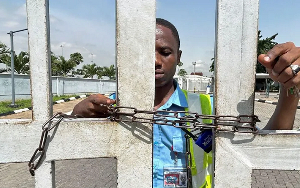Nigeria’s trade unions have suspended a general strike by workers that has brought economic activity to a halt this week.
The decision comes after the government promised to increase the national minimum wage to at least 60,000 naira ($40, £32) a month.
This falls below the $330 that unions have been demanding, but is double the current monthly wage.
The strike began on Monday and led to the shutdown of the country's power grid, leaving millions without electricity.
Government and union representatives say they will now meet every day for a week for further negotiations.
A civil servant in the northern city of Kano told the BBC he was disappointed by the offer, and wanted at least 100,000 naira ($67) a month.
"Even 100,000 naira won’t be enough as prices in the market have gone up but it will be better than what we have now,” said Shittu Lawal, who works in the information ministry in Kano.
"I spend 500 naira to get to work everyday which is not easy, we will return to work now and continue to push for more," he added.
Early on Monday, the country was plunged into darkness shortly after 02:00 local time (01:00 GMT) when union members prevented operators at the country's power control rooms from working and closed electricity substations.
Many flights were also cancelled in the country's busiest airport in Lagos, and in the capital, Abuja, with passengers left stranded.
Schools, offices, and hospitals across the country have also been closed.
This strike is the fourth since President Bola Tinubu came to power a year ago.
Africa News of Tuesday, 4 June 2024
Source: bbc.com

















